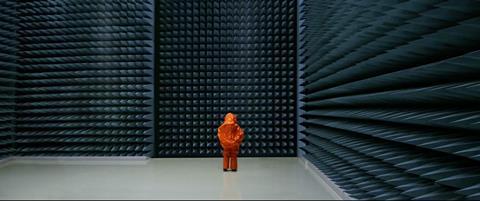Dir/scr: Michael Madsen. Denmark/Austria/Ireland/Finland/Norway. 2015. 83mins

Alien invasions are a staple of Hollywood blockbusters, reliably providing audiences with CGI spectacles of planetary destruction and mass chaos. But how would Earth’s leaders respond to an actual extra-terrestrial arrival? That’s the juicy question explored in agreeably geeky and philosophical terms in The Visit, a documentary which, cannily, isn’t so much about space invaders as it is about the people currently inhabiting this world. An exploration of what human behaviour would look like to beings from another universe, The Visit feels like a report card on civilisation in which the final grades aren’t that promising.
The Visit exudes a playful yet serious tone, asking us to consider civilisation’s pros and cons
Premiering at Sundance and screening as part of True/False and South By Southwest, this new film from director Michael Madsen (not to be confused with the actor of the same name) should be able to find theatrical distribution thanks to its big-screen imagery and delectable hook. Weirdly though, because most of the documentary’s scholars and scientists are based in Europe, The Visit may face some resistance from US audiences, who have gotten very used to movie aliens landing in their home country. But the documentary’s mixture of speculation and wonder ought to make it a comfy fit for art houses, especially appealing to sci-fi fans who enjoy pondering the big questions of existence that often underpin the genre’s best stories.
At the outset, The Visit explains that what we’re about to see is an incident that hasn’t happened yet. The film introduces a scenario in which aliens have just arrived on Earth, their intentions a mystery. Through a series of interviews with everyone from theologians to engineers to a former UK government spokesperson, The Visit wonders what a likely procedure would be for making first contact with the arriving aliens.
Initially, the documentary focuses on practical concerns: What would authorities say to the public to avert widespread panic? (And, would telling people not to panic only incite more alarm?) Who would represent humanity and talk to the alien leaders? Soon, the film’s subjects begin shedding some light on these matters, indicating that there are, in fact, some protocols in place for such a situation. (For instance, the United Nations features an Office for Outer Space Affairs.)
But if the documentary’s early stretches make The Visit play like a real-life take on Independence Day, Madsen (Into Eternity) slowly reveals his deeper motive. Speaking with experts in biology and other sciences, the filmmaker directs many of his subjects to address the camera directly, as if they’re speaking straight to the aliens. And what emerges from these one-sided conversations are fundamental questions about humanity’s legacy: what we have achieved, where we have failed, why we’re consumed with preserving our experiences through art, and what our place is in the universe. As a consequence, the interviews start to feel like an explanation (sometimes an apology) for the human race, the subjects trying to boil down the essence of our centuries of existence into a few minutes.
This technique is even more provocative considering that, since the audience sees these interviews from the alien’s viewpoint, we can, in a sense, stand apart from humanity, judging our species’ behaviour from a somewhat objective perspective. Mostly avoiding touchy-feely proclamations about humanity’s basic decency, The Visit exudes a playful yet serious tone, asking us to consider civilisation’s pros and cons. (For example: Would it be wise to tell the aliens about our propensity for war? Or would lying make it worse?) Interestingly, Madsen’s subjects largely assume that they must be cautious with their “alien” interviewer, as if fearful they might anger the presumably more advanced species that has come to our planet. Repeatedly, The Visit has the air of an unannounced reckoning — humanity’s judgment day, you might say. (One speaker, perhaps conscious of this, mentions that he hopes the aliens are more merciful to us than invading human armies have been to the inhabitants of conquered lands.)
Madsen intercuts his interviews with slow-motion shots of nature and cityscapes that have an almost dreamlike calm. (We never seen any aliens, but the humans on screen in these intercuts are often frozen in place, suggesting the disorientation that would occur after we realise that we’re not alone in the universe.) The Visit is a thought experiment which is light on its feet, happily in awe of the mysteries of the cosmos. But in its modest way, the film also provokes us to reconsider our priorities on this planet, even if aliens never decide to drop by.
Production companies: Magic Hour Films, NGF Geyrhalterfilm, Venom Film, Mouka Filmi, Indie Film, Danish Film Institute, Nordisk Film & TV Fond, Austrian Film Institute, Vienna Film Fund, Film Location Austria (FISA), Land Niederösterreich, The Irish Film Board, The Finnish Film Foundation, Norwegian Film Institute, MEDIA, DR, VPRO, SVT, Yle
International sales: Autlook, www.autlookfilms.com
Producer: Lise Lense-Møller
Cinematography: Heikki Färm
Editors: Nathan Nugent, Stefan Sundlöf
Music: Karsten Fundal
Website: www.thevisitthefilm.com







![The Brightest SunScreen[Courtesy HKIFF]](https://d1nslcd7m2225b.cloudfront.net/Pictures/274x183/3/5/0/1448350_thebrightestsunscreencourtesyhkiff_312678.jpg)













